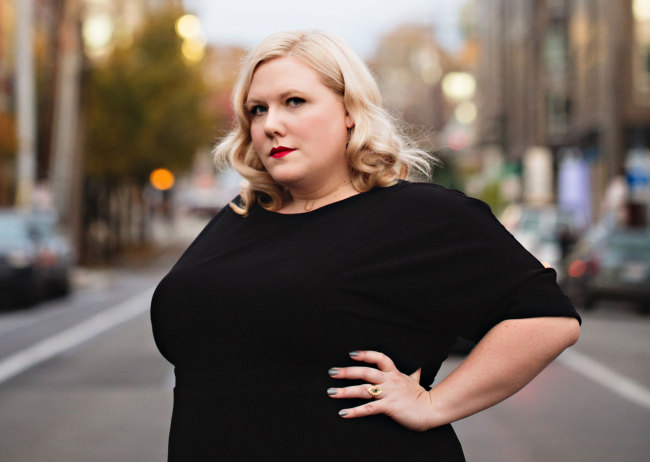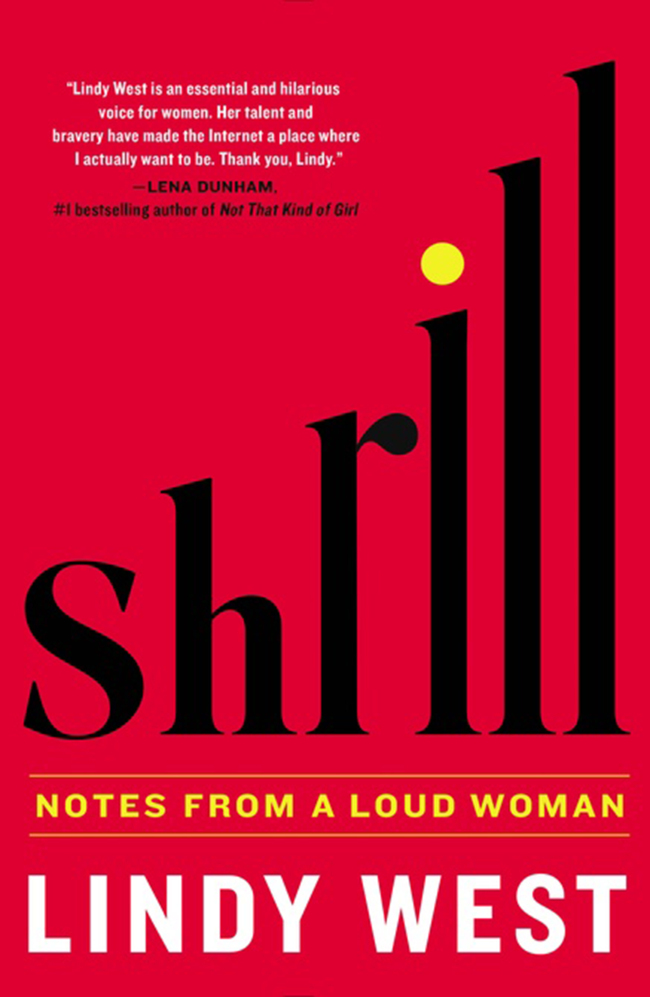Fat and happy: No one tells author Lindy West what to do
By Rumy DooPublished : June 1, 2016 - 13:55
Lindy West is a defender of bodies: women’s bodies, fat bodies, every body’s right to exist in whatever way, shape or form, unjudged and unassailed. “Everyone has a body,” she says. “We haven’t developed brain-in-jar technology yet.” Her writing puts forth the unfortunately radical proposition that each person’s body is that person’s own business.
“It is the thing that most belongs to them. It’s not yours,” she points out over sake bombs and edamame dip, pot stickers and ahi tacos. It’s the most basic of truths, but, again unfortunately, it bears pointing out.
Lindy West is a Seattle native, but with her column in the Guardian, she’s become something of an international hero. Lindy West and I worked together at the alternative weekly the Stranger, where I had the vast pleasure of watching her scathing, incisive and hilarious powers unfold.
Lindy West is also my friend, and witnessing how some treated her along the way made me feel angry and helpless -- and, by implication and inaction, like part of the problem. My own body’s deviation from the norm, through absolutely no virtue of my own, has garnered wondering approval (“How can you be a food writer and stay so skinny?”). Lindy’s body’s deviation from the norm has earned her not just opprobrium, but threats of rape and death, more times that she can count. Working with her -- reading the kind of online comments that she would ultimately attack head-on -- I didn’t know what to do.
“I just realized that this thing had been eating at me for so long, and it also had felt like something I needed to keep a secret for so long,” she says. “‘Oh, don’t write about your body, people will be mean to you, people will make fun of you.’” Which, she notes, did happen -- and in an “acutely painful” way.
“But if people are going to be mean to me and make fun of me anyway, why not take control of the narrative and say something? If you let those people silence you, then you can't advocate for yourself. And you can’t make your life better. And you can’t own your own life.
“And also, on a really practical level,” she says, “once you stop obsessing over being broken and wrong, and you stop starving yourself, and you stop worrying about how many calories you’re eating and how many sit-ups you did that day, it literally frees up time and energy.”
“It is the thing that most belongs to them. It’s not yours,” she points out over sake bombs and edamame dip, pot stickers and ahi tacos. It’s the most basic of truths, but, again unfortunately, it bears pointing out.
Lindy West is a Seattle native, but with her column in the Guardian, she’s become something of an international hero. Lindy West and I worked together at the alternative weekly the Stranger, where I had the vast pleasure of watching her scathing, incisive and hilarious powers unfold.
Lindy West is also my friend, and witnessing how some treated her along the way made me feel angry and helpless -- and, by implication and inaction, like part of the problem. My own body’s deviation from the norm, through absolutely no virtue of my own, has garnered wondering approval (“How can you be a food writer and stay so skinny?”). Lindy’s body’s deviation from the norm has earned her not just opprobrium, but threats of rape and death, more times that she can count. Working with her -- reading the kind of online comments that she would ultimately attack head-on -- I didn’t know what to do.
“I just realized that this thing had been eating at me for so long, and it also had felt like something I needed to keep a secret for so long,” she says. “‘Oh, don’t write about your body, people will be mean to you, people will make fun of you.’” Which, she notes, did happen -- and in an “acutely painful” way.
“But if people are going to be mean to me and make fun of me anyway, why not take control of the narrative and say something? If you let those people silence you, then you can't advocate for yourself. And you can’t make your life better. And you can’t own your own life.
“And also, on a really practical level,” she says, “once you stop obsessing over being broken and wrong, and you stop starving yourself, and you stop worrying about how many calories you’re eating and how many sit-ups you did that day, it literally frees up time and energy.”

Thus began her crusade against the notion that the shape of your body dictates the worth of your being.
“It changed my career, for sure. There was just no going back,” she laughs. “Since then, that’s kind of the cornerstone of the kind of writing that I do ... trying to be really clear, and uncompromising, and stick up for people who aren’t being heard.”
Since leaving the Stranger, Lindy’s also written for Jezebel and GQ; she’s been a key part of the #ShoutYourAbortion campaign. She still spends, as she puts it, “a lot of time getting yelled at on the Internet by people -- mostly men -- who’re very threatened by noncompliant women. ... Mostly it seems to be because I exist as a fat person without apologizing. And because I talk back to them, and am argumentative, and strident.” Until recently, her tagline on Twitter was “Why fat lady so mean to baby-men?”
She’s reaching the people who are threatened by her -- and who threaten her -- and changing some minds in very surprising ways. One of her many, many fights against individual trolls -- real people, with bodies, who use the anonymity of the Internet to be cruel while remaining hidden -- ended with a startling, humanizing and even beautiful confrontation documented on “This American Life.”
Now she has a brand new book -- her first -- called “Shrill.” The subtitle is “Notes from a Loud Woman.” It’s a memoir, she explains, “a book about growing up feeling like you don’t fit, in both a literal and figurative way. So it’s just stories from my life about coming to terms with my body, and learning to live my life not feeling like a work in progress. And learning about feminism, and learning about how to be a partner, just all these things that young women, especially, struggle with. ... I wrote the book that I needed 15 years ago, that I didn’t have.”
There’s not much in the book about food per se, but Lindy is a vocal critic of the diet industry. “It’s all a scam. ... It drains women of money, and money is power or whatever -- that seems like a cliche, but it’s true -- and it also keeps women locked in this eternal battle against each other, where we’re ranking each other ... it saps your brain space, and it doesn’t f------ work. Which is why it’s such a successful industry. It doesn’t work.”
Present-day food culture also doesn’t work, with food porn on one side, the obesity epidemic on the other, and not much in between. You can be fat and left alone, Lindy notes, “but you have to be a good fat person who’s, you know, doing their penance. You have to post pictures on Instagram that prove that you eat salad; otherwise, you’re the bad kind.”
Her assertion: “You can’t tell people what to eat and what to do with their bodies. And lives are huge and complex. ... Why don’t you just campaign for healthier school lunches? Why don’t you campaign for longer recess? Why don’t we raise the minimum wage so that moms -- or dads -- don’t have to work three jobs, and they can be home and cook food for their families? Instead ... we stigmatize them and call them stupid and fat for feeding McDonald’s to their kids. The whole system is broken, and the only solution people can come up with is to punish the people victimized by that system.”
Lindy is, however, seeing improvement. “I think it’s incrementally getting better,” she says -- more role models, more academics doing important work, more revelations about “The Biggest Loser.”
Meanwhile, what can we all do? “Just be nice to the fat people in your life, and don’t judge them and tell them what to do,” Lindy says. “And listen to them.

“And don’t beat yourself up if you eat a doughnut or whatever. It’s OK to have a doughnut. It’s OK to have a doughnut every day, if that’s what makes you happy. We only have one life, so you might as well live it how you want. As long as you’re not murdering people and stuff.
“It is not OK to force-feed a stranger a doughnut every day,” she laughs. (TNS)
By Bethany Jean Clement
The Seattle Times








![[Graphic News] More Koreans say they plan long-distance trips this year](http://res.heraldm.com/phpwas/restmb_idxmake.php?idx=644&simg=/content/image/2024/04/17/20240417050828_0.gif&u=)
![[KH Explains] Hyundai's full hybrid edge to pay off amid slow transition to pure EVs](http://res.heraldm.com/phpwas/restmb_idxmake.php?idx=644&simg=/content/image/2024/04/18/20240418050645_0.jpg&u=20240419100350)





![[From the Scene] Monks, Buddhists hail return of remains of Buddhas](http://res.heraldm.com/phpwas/restmb_idxmake.php?idx=652&simg=/content/image/2024/04/19/20240419050617_0.jpg&u=20240419175937)

![[KH Explains] Hyundai's full hybrid edge to pay off amid slow transition to pure EVs](http://res.heraldm.com/phpwas/restmb_idxmake.php?idx=652&simg=/content/image/2024/04/18/20240418050645_0.jpg&u=20240419100350)

![[Today’s K-pop] Illit drops debut single remix](http://res.heraldm.com/phpwas/restmb_idxmake.php?idx=642&simg=/content/image/2024/04/19/20240419050612_0.jpg&u=)